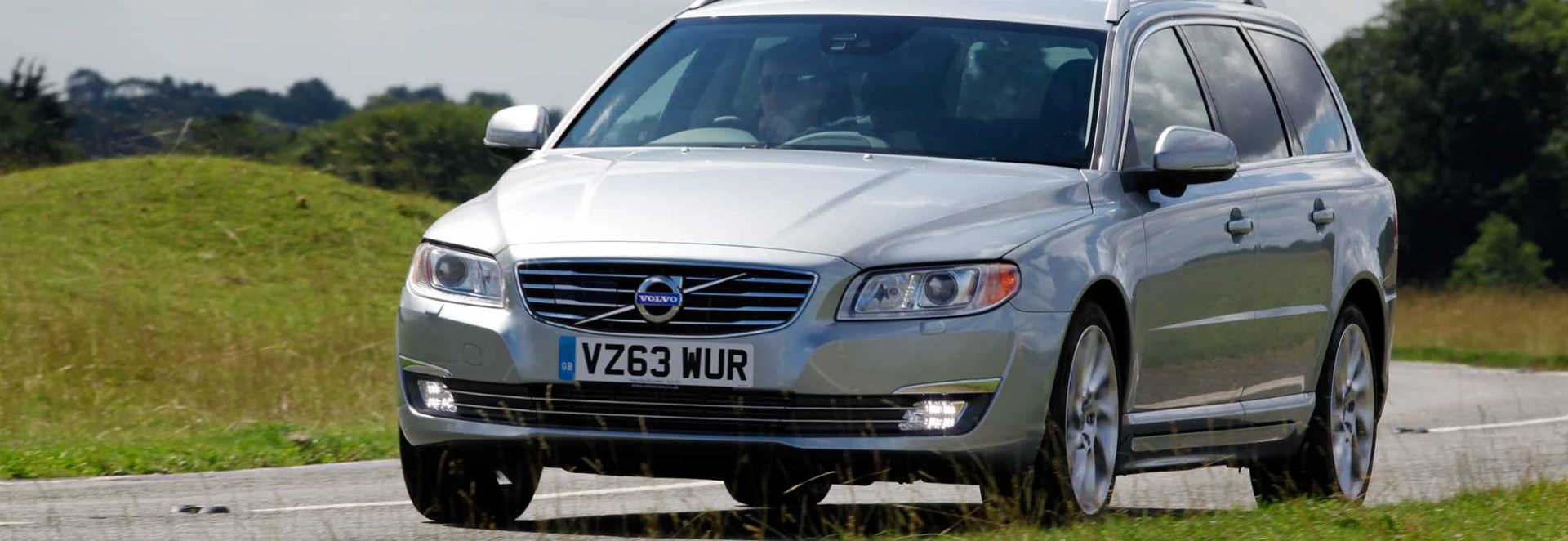Despite the enormous success of the XC90 SUV, the V70 estate is still regarded by some as the core model of Volvo's range. Its heritage stretches back at least as far as the 1990s 850, though nowadays there is no saloon body styles.
They are also all diesels, with a choice of two 2-litre units called the D3 (148bhp) and D4 (179bhp). The more economical D2 and more powerful D5 engines have recently been discontinued. D3s and D4s are both available with a six-speed manual gearbox, and there's a six-speed Geartronic automatic option for the D3. The automatic alternative for the D4 has eight gears.
Nowadays the V70 also forms the basis for the XC70, a four-wheel drive model with extra off-road ability.
Performance
High-speed Volvo estates of this size are practically a thing of the past. Straight-line performance in the current V70 is respectable rather than startling, the D3s being capable of accelerating from 0-62mph in 9.8 seconds while the D4s can do the same thing in 8.6. The D4 engine can produce well over half its maximum power at less than 2,000rpm, so you don't have to rev it at all hard to make it perform well.
If this isn't enough for you, there's a factory-approved ECU (Engine Control Unit) upgrade by Swedish race team Polestar which raises the D4's output to 197bhp at a cost of £830.
Ride and Handling
Even by the standards of large estate cars, V70s feel ponderous, and you're never going to have much fun driving one.
Even by the standards of large estate cars, V70s feel ponderous, and you're never going to have much fun driving one. But perhaps you don't want to. Volvo used to offer a suspension upgrade called Active 4 C (the Cs standing for Continuously Controlled Chassis Concept) but it wasn't popular and, like the D2 and D5 engines, it's no longer available.
Interior and Equipment
Volvo's first estate car was the 1953 Duett, based on the then-current PV saloon which it outlived by three years.
The V70's luggage capacity varies between 575 and 1,600 litres depending on what you do with the rear seats. That's a decent amount of room, but if load-carrying is a priority you might want to look elsewhere. The estate versions of the Ford Mondeo and Skoda Superb are more spacious. In ascending order, the three trim levels are called Business Edition, SE Nav and SE Lux. All of them include satellite navigation, DAB digital radio, cruise control, roof rails and a formidable amount of safety equipment including the City Safety system. Leather upholstery starts with the SE Nav, and the SE Lux has Volvo's excellent TFT digital instrument display. Oddly, heating for the front seats and windscreen are available only as part of the optional Winter Pack. Other Packs contain such items as adaptive cruise control, pedestrian and cyclist detection, cornering headlights and laminated windows. Among the stand-alone options are wheels ranging in diameter from 17 to 19 inches (16s are fitted as standard), a heated steering wheel and two alternative suspension set-ups - one for sportier driving (unlikely), the other for load-carrying.
Cost
Volvo has done a magnificent job of making the V70 perform well on the EU fuel economy test, to the point where all the manual models record figures of well over 60mpg.
The D3 manual Business Edition costs around £26,000, which is therefore only slightly more expensive than a top-level Ford Focus estate. Pricing goes up to near £35k for the D4 SE Lux, for which automatic transmission is a £1,550 option, and it wouldn't be difficult to spend over £40,000 if you went heavy on the extras. On the face of it, running costs look as if they should be very low. The highest CO2 output of any of the manual models is just 114g/km, which means annual Vehicle Excise Duty of just £30 and a Benefit In Kind rating of 21% in the 2015-16 finanical year, rising gradually to 27% in 2019-20. Geartronic versions are less impressive, but still outstandingly cheaper to tax than would have been expected of a large Volvo just a few years ago. Volvo has done a magnificent job of making the V70 perform well on the EU fuel economy test, to the point where all the manual models record figures of well over 60mpg. Actually achieving this is another matter. We have never averaged better than 50mpg even in smaller Volvos with the D4 engine and wouldn't expect to in the V70 either.
Our Verdict
The V70 formula has worked for a very long time, and up to a point it still does. It has achieved something close to modern classic status, and scores brilliantly for tax and well for practicality. The dull driving experience and difficulty of matching the official economy figures are negative points, but committed V70 fans probably won't be too bothered by either. It can transport a lot at once with minimum fuss and in an impressively efficient manner as well. For those reasons it’s worth considering this car if you’re aiming to buy a very spacious family motor.




